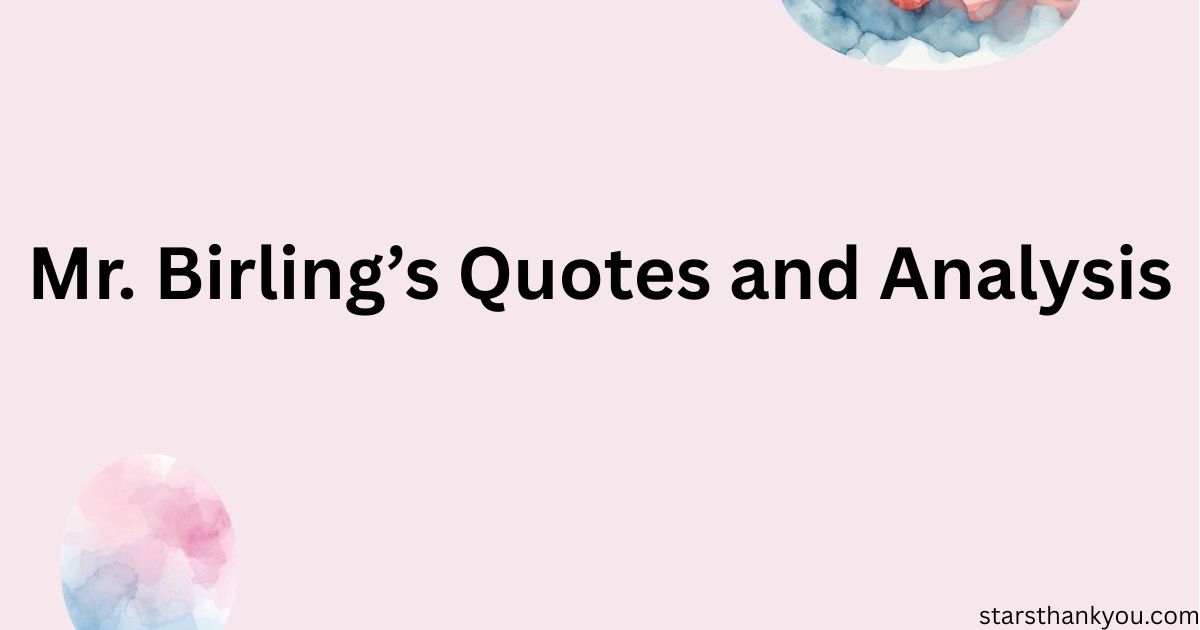Ever read An Inspector Calls and found yourself wondering why Mr. Birling says the things he does? You’re not alone. Many students and readers get frustrated trying to figure out what his confident, often arrogant quotes really mean and what Priestley was trying to say through them. That’s why understanding Mr. Birling’s quotes and analysis can actually make the whole play click in a new way.
In this blog, we’ll break down the most important Mr. Birling’s quotes and analysis in simple, easy-to-grasp language. You’ll see how each line reflects his personality, values, and the deeper themes Priestley wanted to highlight. By the end, you’ll not only understand Mr. Birling better but also feel more confident writing about him in essays or discussions.
Who Is Mr. Birling in An Inspector Calls?
1. Mr. Birling is portrayed as the proud face of capitalism and self-importance. He represents a man driven by wealth, class, and ambition, someone who believes success is measured by money, not morality.
2. In Mr. Birling’s quotes and analysis, we see Arthur Birling as more than just a character; he’s a symbol of social pride and materialism. His quotes reflect the arrogance of those who value profits over people.
3. Priestley uses Mr. Birling to personify capitalism’s flaws. His speeches and beliefs expose how the pursuit of status often replaces empathy and responsibility in society.
4. Mr. Birling’s confidence hides his deep insecurity. He constantly seeks validation from the upper class, proving his obsession with reputation and recognition.
5. His character is designed to frustrate the audience. Each line he speaks reinforces his ignorance of the world around him, especially when he dismisses war and social change.
6. Birling’s belief that “a man has to look after himself” sums up his selfish ideology. He places individual success above collective responsibility, embodying the capitalist mindset Priestley criticizes.
7. Through Mr. Birling, Priestley contrasts old and new generations. His stubborn pride clashes with Sheila and Eric’s growing awareness, showing how society must evolve.
8. The dramatic irony in his confident statements, like predicting no war, exposes his arrogance and lack of insight, making him both foolish and symbolic of blind capitalism.
9. Mr. Birling’s relationship with the Inspector is tense and defensive. His inability to accept criticism highlights how power often resists accountability.
10. Ultimately, Mr. Birling represents more than one man; he stands for an entire system built on greed, pride, and denial. His downfall serves as a warning to audiences about the dangers of ignoring social responsibility.
Mr. Birling’s Personality and Traits
1. Mr. Birling’s personality is built on arrogance and self-importance. He constantly reminds others of his success, believing that wealth and status make him superior.
2. In Mr. Birling’s quotes and analysis, his arrogance, selfishness, and insecurity define who he truly is. Every word he speaks exposes his obsession with power, reputation, and personal gain.
3. Mr. Birling’s arrogance blinds him to reality. He ignores warnings, mocks social progress, and speaks with overconfidence about things he doesn’t understand, like war or economics.
4. His selfishness reflects his capitalist mindset. He’s more concerned with profits and status than the welfare of his workers or even his own family’s moral growth.
5. Beneath his proud exterior lies deep insecurity. Mr. Birling constantly seeks approval from people of higher status, such as Gerald’s family, showing how fragile his confidence really is.
6. Priestley portrays Birling as emotionally detached and morally unaware. He treats people as tools for personal success rather than as individuals deserving empathy or respect.
7. Mr. Birling’s need for control dominates his interactions. He silences Sheila, dismisses Eric, and tries to intimidate the Inspector, showing his fear of losing authority.
8. His personality is a perfect symbol of capitalist greed. Every action he takes reflects the pursuit of wealth and social stability, even at the cost of human decency.
9. Through his character, Priestley criticizes how arrogance and insecurity often coexist in people who hold power. Mr. Birling’s false confidence hides a desperate need to appear important.
10. Overall, Mr. Birling’s personality and traits make him the embodiment of social ignorance. His arrogance isolates him, his selfishness corrupts him, and his insecurity exposes the weakness behind his pride.
Read More : Memorable Boxing Quotes to Inspire Your Journey in the Ring
Famous Mr. Birling Quotes and Their Meanings
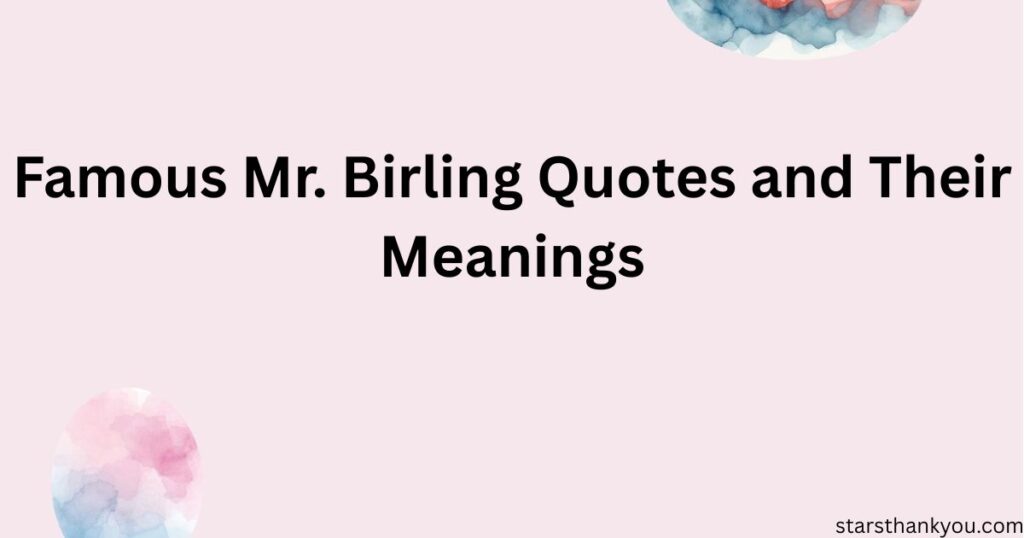
1. One of Mr. Birling’s most telling lines is “A man has to look after himself – and his family.” This shows how his worldview revolves around self-interest, ignoring social responsibility and compassion for others.
2. In Mr. Birling’s quotes and analysis, “There isn’t a chance of war” stands out as an example of his arrogance and ignorance. Priestley uses dramatic irony to make audiences lose trust in Birling’s authority, highlighting how out of touch he is with reality.
3. When he declares “Lower costs and higher prices,” it exposes his greed and capitalist hunger for profit. He views workers like Eva Smith as tools for wealth, showing how capitalism dehumanizes those at the bottom.
4. The quote “I can’t accept any responsibility” defines Mr. Birling’s selfish nature. His complete denial of guilt reflects a man who values reputation over remorse, and pride over morality.
5. In “The way some of these cranks talk and write now,” Priestley captures Birling’s mocking tone towards socialism. He dismisses collective care as foolish, reinforcing his rigid, outdated capitalist values.
6. His confident remark, “The Titanic…unsinkable, absolutely unsinkable,” is a classic example of dramatic irony. It exposes his blind faith in progress and power, making him a symbol of ignorance and false certainty.
7. When Birling says, “Nothing to do with you, Sheila. Run along,” it shows his condescending and patriarchal mindset. He treats Sheila as naïve, reflecting how his arrogance extends even into his family life.
8. The desperate line “I’d give thousands, yes, thousands” reveals his hypocrisy. He offers money only when it’s too late, showing that his wealth-driven morality cannot buy redemption or erase guilt.
9. In “There’s a good deal of silly talk about these days,” Birling dismisses social reform. His words highlight how the upper class viewed progress as a threat to their privilege and power.
10. Finally, “The whole damned thing can be a piece of bluff” shows his disbelief and denial. Even at the end, Mr. Birling’s arrogance blinds him, proving that ignorance, not intelligence, drives his confidence.
Mr. Birling’s Views on Class and Responsibility
1. Mr. Birling’s views on class are shaped by arrogance and privilege. He sees social hierarchy as natural and believes wealth determines a person’s worth, leaving no room for empathy or equality.
2. In Mr. Birling’s quotes and analysis, Birling’s lack of responsibility is one of his defining flaws. He constantly dismisses the idea of social duty, proving that his self-interest outweighs any sense of moral obligation.
3. The quote “A man has to look after himself and his family” perfectly sums up his individualistic mindset. For Birling, community care and social justice are irrelevant compared to personal success.
4. His phrase “If you don’t come down sharply on some of these people, they’d soon be asking for the earth” exposes how he sees workers as threats rather than human beings, reflecting deep class prejudice.
5. Mr. Birling’s belief that “everyone should mind their own business” mirrors his ignorance toward social reform. Priestley uses this to show how selfishness fuels inequality.
6. He refuses to take any responsibility for Eva Smith’s death, insisting, “I can’t accept any responsibility.” This shows how disconnected he is from the moral consequences of his actions.
7. Birling’s treatment of the Inspector reveals his discomfort with accountability. He rejects the idea of collective responsibility because it challenges his authority and capitalist control.
8. His elitist mindset is further shown when he dismisses the struggles of the working class. He believes poverty is the fault of the poor, showing how his privilege blinds him to social injustice.
9. Priestley uses Birling as a warning to audiences about the dangers of ignoring social duty. His lack of compassion and moral responsibility serves as a critique of the upper-class mentality.
10. Ultimately, Mr. Birling’s views on class and responsibility reveal a man consumed by greed, pride, and fear of change. His ignorance symbolizes the moral decay that Priestley urges society to overcome.
Mr. Birling’s Ignorance and Dramatic Irony
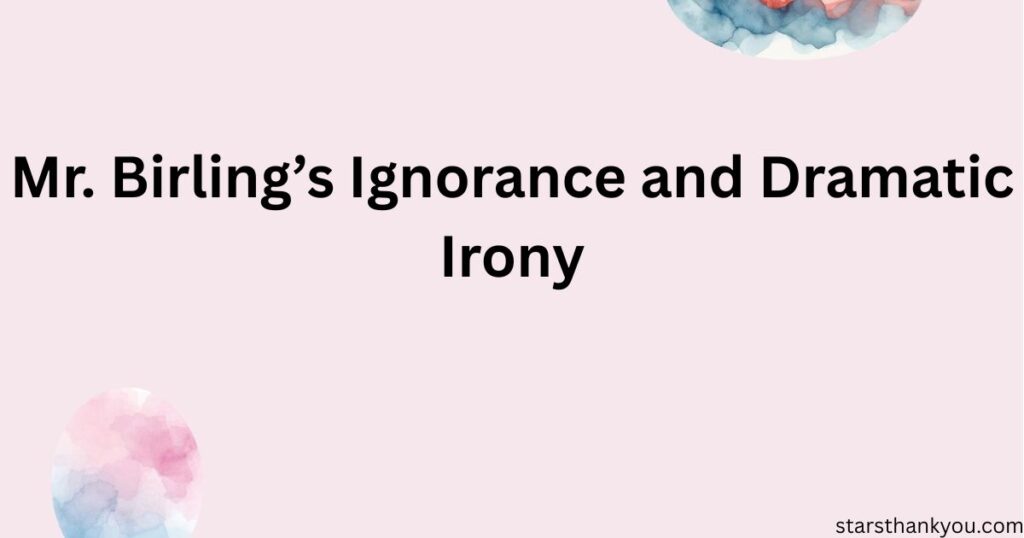
1. Mr. Birling’s ignorance forms the backbone of Priestley’s criticism of arrogance and blindness in the upper class. He proudly makes confident claims that history immediately proves wrong, showing how foolish and out of touch he really is.
2. In Mr. Birling’s quotes and analysis, Birling’s “unsinkable, absolutely unsinkable” line about the Titanic is one of the most powerful uses of dramatic irony, symbolizing his inability to see beyond his narrow capitalist mindset.
3. Priestley designs Birling’s character to represent a man blinded by wealth, pride, and ignorance. His wrong predictions about war and progress expose his shallow understanding of the world.
4. The audience, knowing the true outcomes of Birling’s statements, instantly sees the irony. This creates both humor and criticism, making Birling a mouthpiece for outdated, self-serving ideologies.
5. Dramatic irony becomes Priestley’s strongest tool against ignorance. Every time Birling speaks, he unintentionally proves his own lack of awareness and understanding of social change.
6. Birling’s ignorance isn’t just about facts, it’s moral too. His refusal to accept responsibility or show compassion reveals how blind he is to human suffering and social duty.
7. His overconfidence and empty certainty symbolize the failure of the older generation to foresee consequences, whether personal, social, or political.
8. Through Birling’s misguided speeches, Priestley exposes the arrogance of those who think power and money make them infallible. His ignorance becomes a warning to the audience about misplaced confidence.
9. Birling’s belief that “a man has to mind his own business” further deepens the irony. While he preaches independence, his actions contribute to the tragedy he’s desperate to ignore.
10. Ultimately, Priestley uses Mr. Birling’s quotes and analysis to show that ignorance wrapped in pride leads only to downfall. Birling’s blind certainty isn’t a strength; it’s a mirror reflecting the moral failures of a capitalist society.
Also Read This : Happy Sunday Quotes: Inspirational, Funny, Motivational & Cute Messages to Brighten Your Day
Mr. Birling and Capitalism in An Inspector Calls
1. Mr. Birling perfectly embodies the selfish nature of capitalism. He values profit over people, power over empathy, and status over morality, making him Priestley’s sharpest critique of a system that rewards greed.
2. In Mr. Birling’s quotes and analysis, his statements like “a man has to make his own way” highlight his belief in individualism. Priestley uses this attitude to reveal the coldness and lack of compassion at the heart of capitalist thinking.
3. Birling’s obsession with money and reputation drives his every action. His refusal to raise workers’ wages or accept social responsibility shows how capitalism strips away humanity and moral values.
4. Through Birling, Priestley exposes how the capitalist elite live in denial. They see success as a personal achievement, ignoring the suffering that sustains their comfort and wealth.
5. His arrogance and pride make him blind to the flaws of the system he defends. Birling’s confidence in eternal prosperity mirrors the blindness of pre-war industrialists who refused to change until disaster struck.
6. Priestley uses irony to emphasize capitalism’s hypocrisy. Birling preaches independence while relying on others’ labor and exploitation to maintain his wealth.
7. The Inspector’s arrival challenges Birling’s capitalist worldview, forcing the audience to question whether wealth without conscience is truly worth admiring.
8. Every line spoken by Birling echoes a warning: unchecked capitalism leads to division, inequality, and ultimately, destruction. His ignorance becomes the playwright’s moral weapon.
9. Priestley contrasts Birling’s self-serving logic with the Inspector’s message of collective responsibility, showing how two ideologies, capitalism and socialism, collide in this moral drama.
10. Through Mr. Birling’s quotes and analysis, we see how Birling symbolizes a decaying capitalist mindset. Priestley doesn’t just criticize him; he uses him as a lesson about the dangers of greed and moral blindness.
Mr. Birling’s Relationship with Sheila and Eric
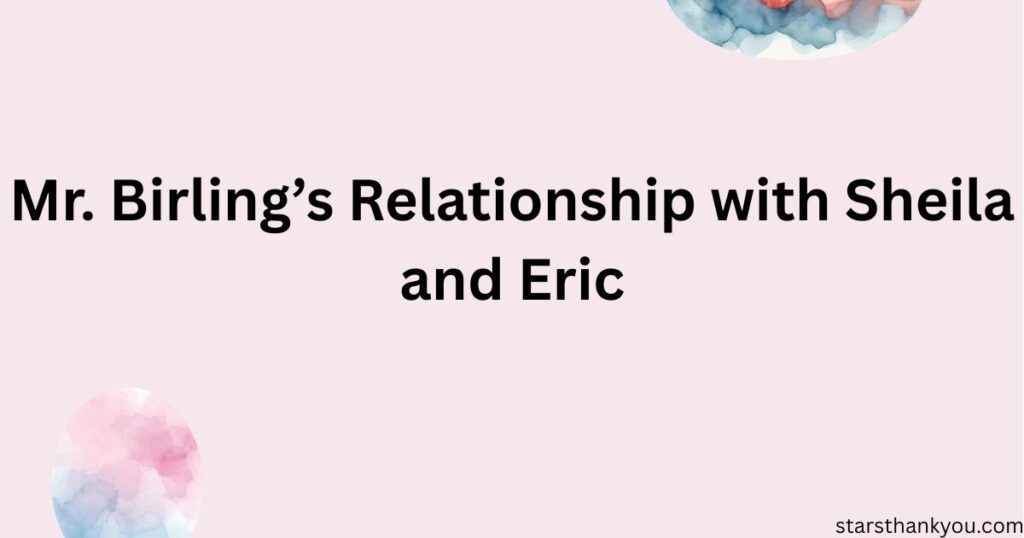
1. Mr. Birling’s relationship with his children, Sheila and Eric, reflects his dominance and traditional mindset. He treats them not as independent thinkers but as extensions of his authority, expecting obedience rather than understanding.
2. In Mr. Birling’s quotes and analysis, Birling’s dismissive tone toward Sheila and Eric reveals his fear of losing control. He mocks their compassion and progressive ideas, showing the generational clash between old capitalist values and new moral awareness.
3. His controlling behavior comes from insecurity; he hides his fear of social change behind a mask of confidence. Priestley uses this dynamic to highlight how the younger generation threatens the comfort of the old order.
4. Birling’s condescending attitude toward Sheila’s engagement and Eric’s drinking shows his need to maintain authority. Instead of guiding them, he criticizes and silences them, revealing his emotional detachment as a father.
5. Priestley builds tension through these strained relationships. While Sheila and Eric learn and grow from the Inspector’s message, Birling refuses to change, showing how the older generation’s pride creates a moral divide within families.
6. The more Sheila and Eric question him, the more Birling doubles down on his arrogance. His defensiveness exposes his fear of losing relevance in a changing world that values empathy over ego.
7. Birling’s dismissive attitude toward his children’s opinions highlights his failure as both a father and a moral guide. He values social status over emotional connection, symbolizing the cold heart of capitalism.
8. Sheila’s growing defiance contrasts beautifully with Birling’s stubbornness. Through their clashes, Priestley celebrates youthful awareness and challenges blind obedience to outdated authority.
9. Eric’s frustration with his father mirrors the frustration of an entire generation tired of being silenced. Birling’s arrogance prevents any real understanding, deepening the emotional distance between them.
10. Ultimately, Mr. Birling’s quotes and analysis show how Birling’s controlling attitude ruins his bond with Sheila and Eric. Priestley uses this tension to prove that change comes not from authority but from listening, compassion, and growth.
How Priestley Uses Mr. Birling to Deliver a Moral Message
1. J.B. Priestley uses Mr. Birling as a warning symbol of selfishness and moral blindness. Through Birling’s arrogance and lack of empathy, Priestley exposes how capitalism corrupts values and destroys any sense of social responsibility.
2. In Mr. Birling’s quotes and analysis, Birling’s speeches reveal Priestley’s deeper message: greed and ignorance lead to downfall. His words about “every man for himself” are deliberately ironic, contrasting with the play’s moral theme of unity and compassion.
3. Priestley didn’t create Birling just to criticize a single man; he represents an entire mindset built on power and privilege. The audience is meant to see how his arrogance mirrors the attitudes that caused inequality and suffering in society.
4. Every time Birling dismisses the idea of collective responsibility, Priestley reminds us how dangerous it is when people ignore the needs of others. His overconfidence becomes a moral lesson about the importance of humility and awareness.
5. Priestley’s socialist intentions are clear; he uses Birling as a contrast to the Inspector, who embodies conscience and morality. Together, they form the play’s central moral conflict between selfishness and shared responsibility.
6. The downfall of Birling’s confidence by the end of the play is symbolic. His moral blindness leaves him isolated, proving Priestley’s message that success without compassion is ultimately meaningless.
7. Through irony and satire, Priestley transforms Birling into both a warning and a mirror. Audiences are encouraged to recognize similar arrogance in their own society and question whether progress has truly been made.
8. Birling’s character shows that moral lessons often come from failure. His mistakes teach the audience what happens when greed outweighs empathy and when pride replaces understanding.
9. Priestley wanted to inspire change, not just criticism. By presenting Birling’s downfall, he urges people to choose kindness and social unity over individual gain.
10. Ultimately, Mr. Birling’s quotes and analysis reveal that Priestley’s moral message is timeless. True progress depends on empathy, equality, and the courage to care for others beyond ourselves.
Comparison Between Mr. Birling and Other Characters
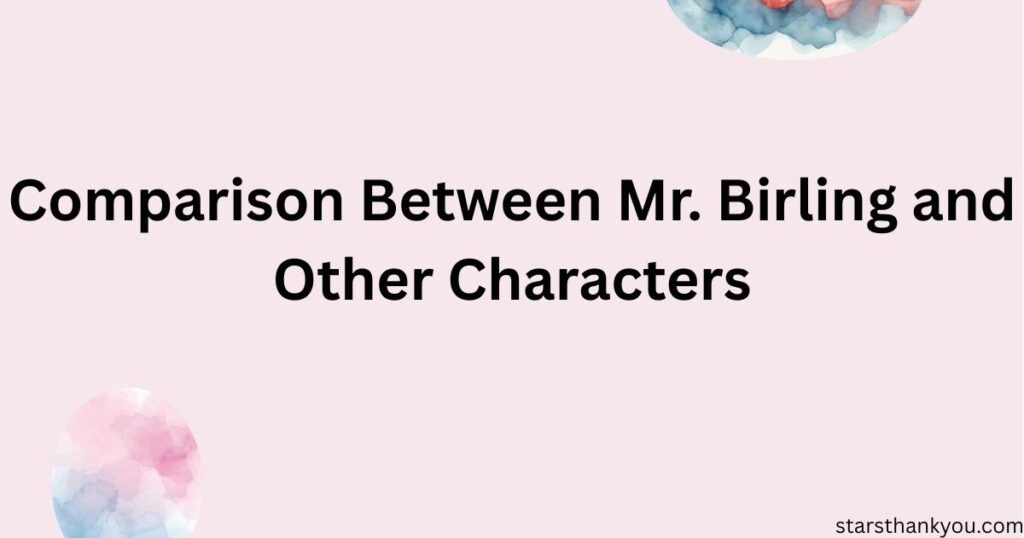
1. The contrast between Mr. Birling and other characters in An Inspector Calls reveals the moral divide at the heart of the play. While Birling represents selfish ambition and greed, Sheila, Eric, and the Inspector embody growth, empathy, and social awareness.
2. In Mr. Birling’s quotes and analysis, we see how Birling’s arrogance and capitalist mindset directly clash with the Inspector’s moral authority. The Inspector challenges everything Birling stands for: individualism, denial, and pride, by advocating for unity and responsibility.
3. Sheila acts as Birling’s moral opposite. While he refuses to change, she learns, reflects, and accepts blame. Priestley uses this contrast to symbolize the hope of a younger, more compassionate generation ready to break free from old ideologies.
4. Eric, though flawed, also evolves beyond his father’s influence. His guilt and emotional honesty contrast sharply with Birling’s stubbornness, highlighting the human capacity for growth when one accepts responsibility.
5. Priestley crafts these character contrasts to create tension and reflection. Through their differences, he makes the audience question: who truly understands morality, the man of power, or the people who learn from their mistakes?
6. The Inspector’s calm, moral tone shatters Birling’s false confidence. While Birling boasts about business and success, the Inspector speaks of justice and humanity, exposing how shallow Birling’s worldview really is.
7. Sheila’s journey of self-awareness stands as a direct challenge to her father’s ignorance. Her compassion and courage to admit fault represent the progress Priestley wants society to embrace.
8. Eric’s defiance adds emotional depth to this moral battle. His frustration with Birling’s hypocrisy shows how the younger generation seeks truth and accountability instead of appearances and denial.
9. Priestley uses these contrasts not just to tell a story but to reflect social change. Each character stands as a mirror to Birling’s failure, revealing that moral strength lies in empathy, not arrogance.
10. Ultimately, Mr. Birling’s quotes and analysis highlight how Birling’s refusal to evolve makes him the moral outsider. In comparison, Sheila, Eric, and the Inspector become symbols of hope, honesty, and the possibility of a better, fairer world.
You Also Like This : Peep Show Quotes about Life
FAQs
What are 5 key quotes from Mr. Birling?
- “A man has to look after himself and his family.”
- “The Titanic…unsinkable, absolutely unsinkable.”
- “There isn’t a chance of war.”
- “I can’t accept any responsibility.”
- “Lower costs and higher prices.”
What quotes show Mr. Birling as selfish?
- “A man has to make his own way.”
- “Lower costs and higher prices.”
- “I can’t accept any responsibility.”
What was Mrs. Birling’s famous quote?
- “I accept no blame for it at all,” reveals her complete denial of guilt.
- Shows her cold-hearted nature and lack of compassion for Eva Smith.
- Reflects her pride and moral blindness as part of the upper class.
What is Mr. Birling’s responsibility quote?
- “I can’t accept any responsibility,” defines his selfish worldview.
- Shows his refusal to recognize the impact of his actions.
- Highlights the capitalist attitude Priestley aimed to criticize.
What lesson does Priestley teach through Mr. Birling?
- Arrogance and greed lead to downfall and isolation.
- True morality comes from empathy and social responsibility.
- Priestley urges society to learn from Birling’s mistakes and embrace change.
Conclusion
In conclusion, Mr. Birling stands as one of Priestley’s most powerful symbols of arrogance, ignorance, and moral blindness. Through his words and actions, the playwright exposes how pride and capitalism can distance people from compassion and truth.
Ultimately, Mr. Birling’s quotes and analysis remind us that real progress comes from reflection and change. While Birling refuses to grow, the younger generation learns, showing that awareness and empathy, not power or wealth, define true strength in society.

Zarnab Naeem is a professional article writer and SEO expert, specializing in crafting content that ranks and resonates. With extensive experience in digital publishing, Zarnab combines creativity with strategy to deliver results. Passionate about quality, every piece is tailored for impact and engagement.

